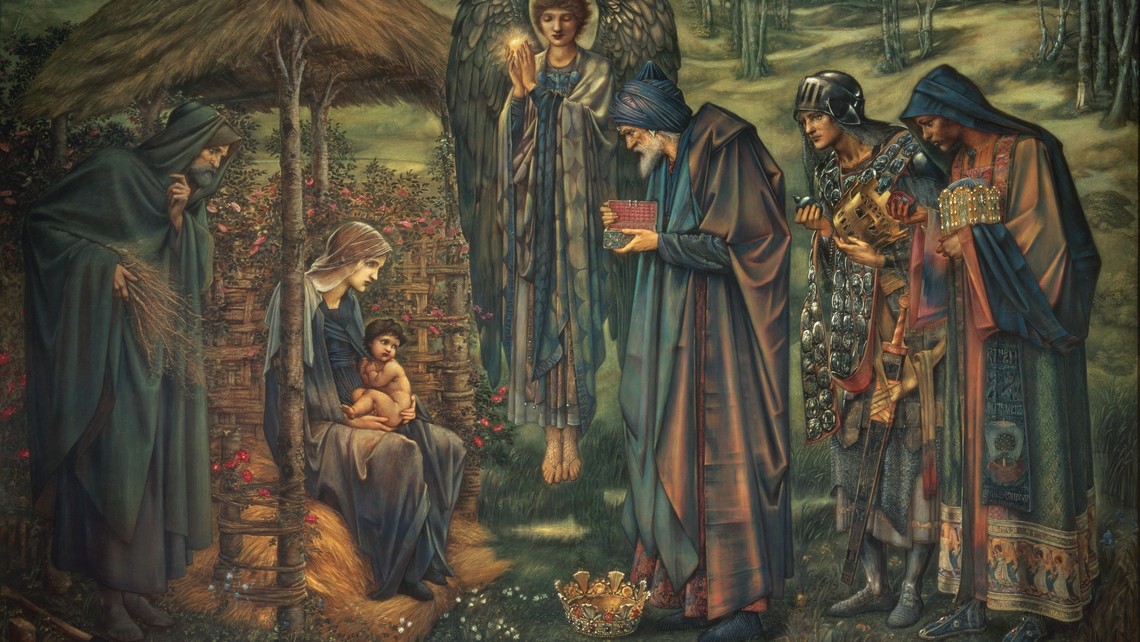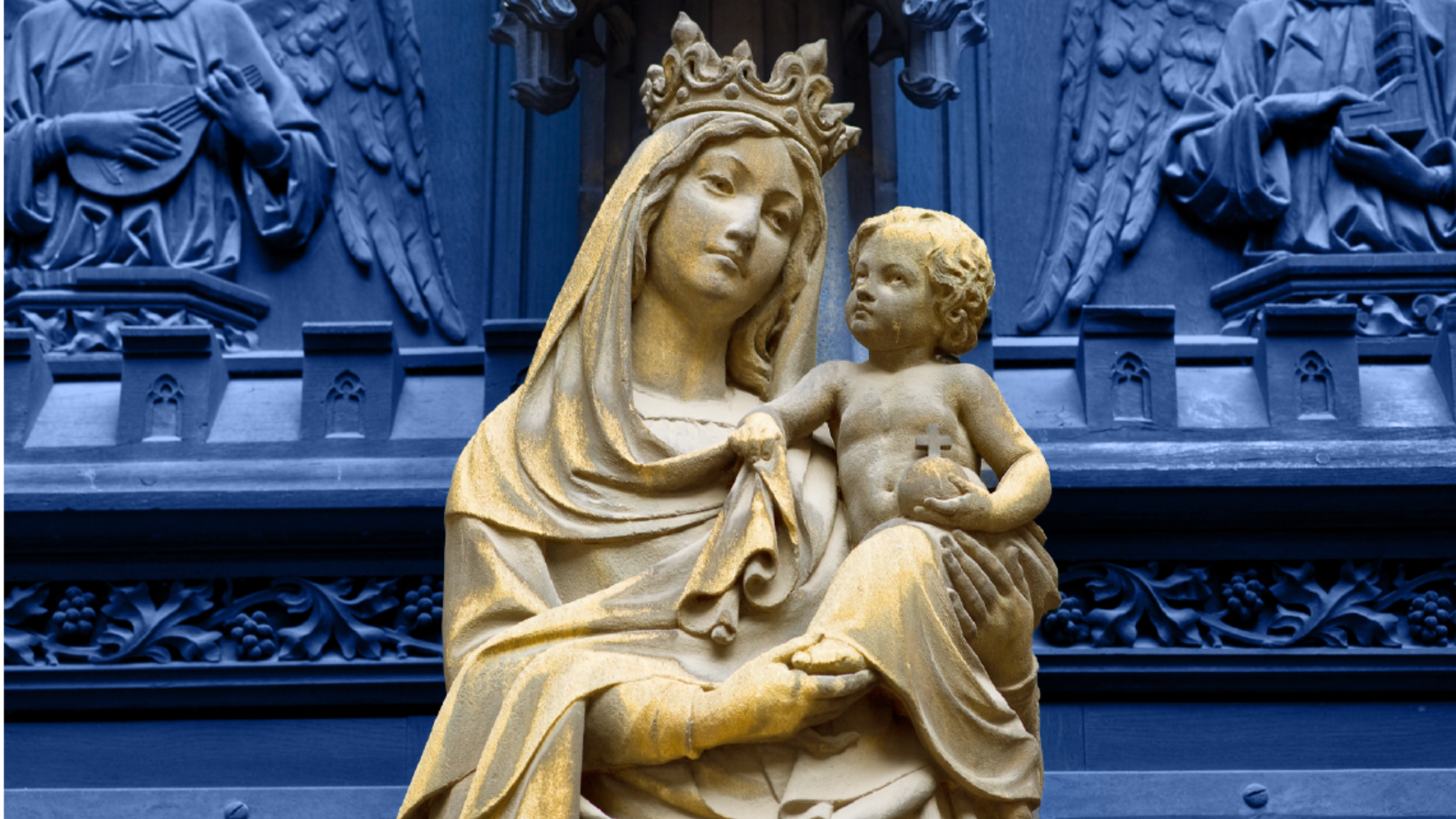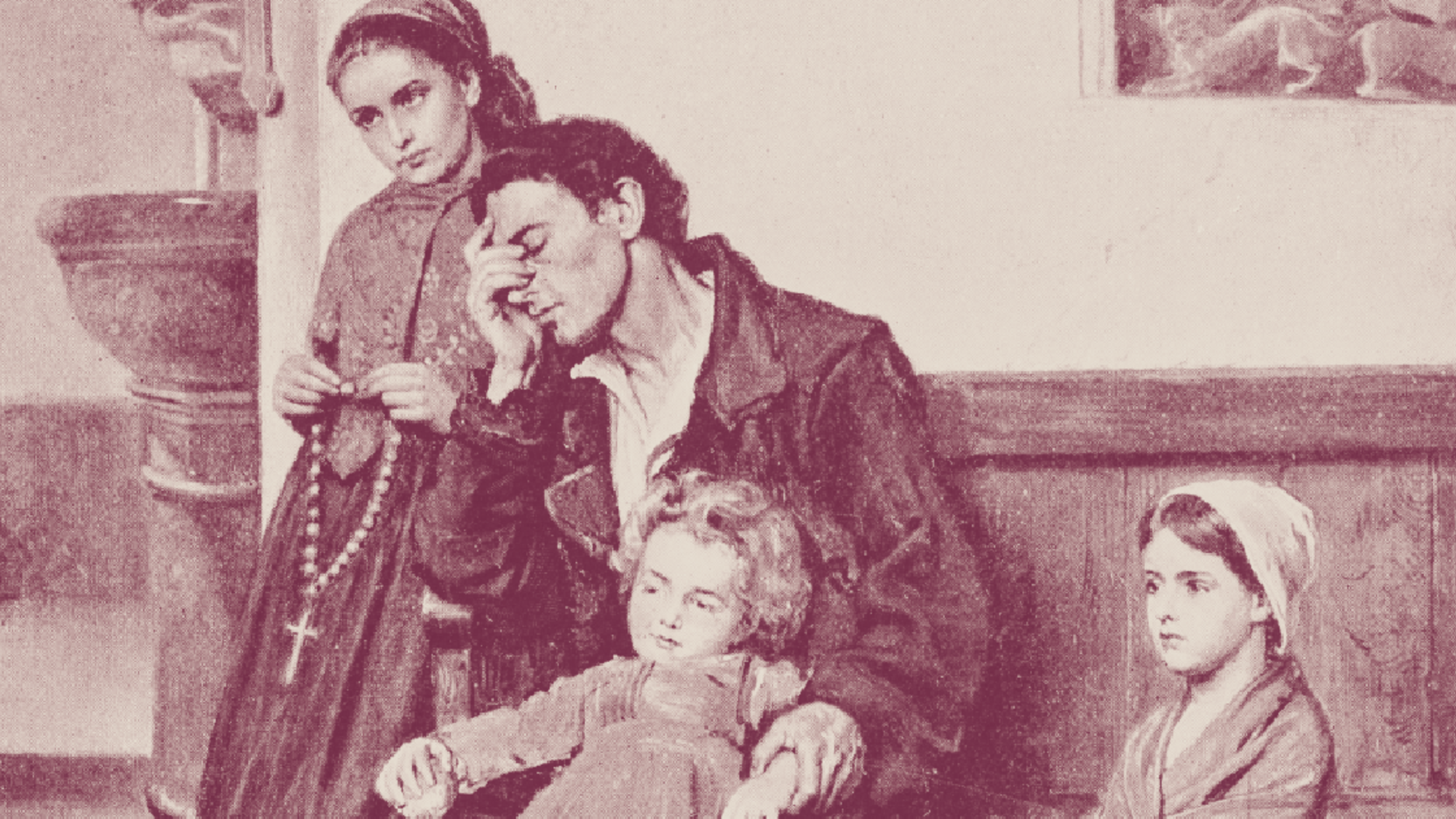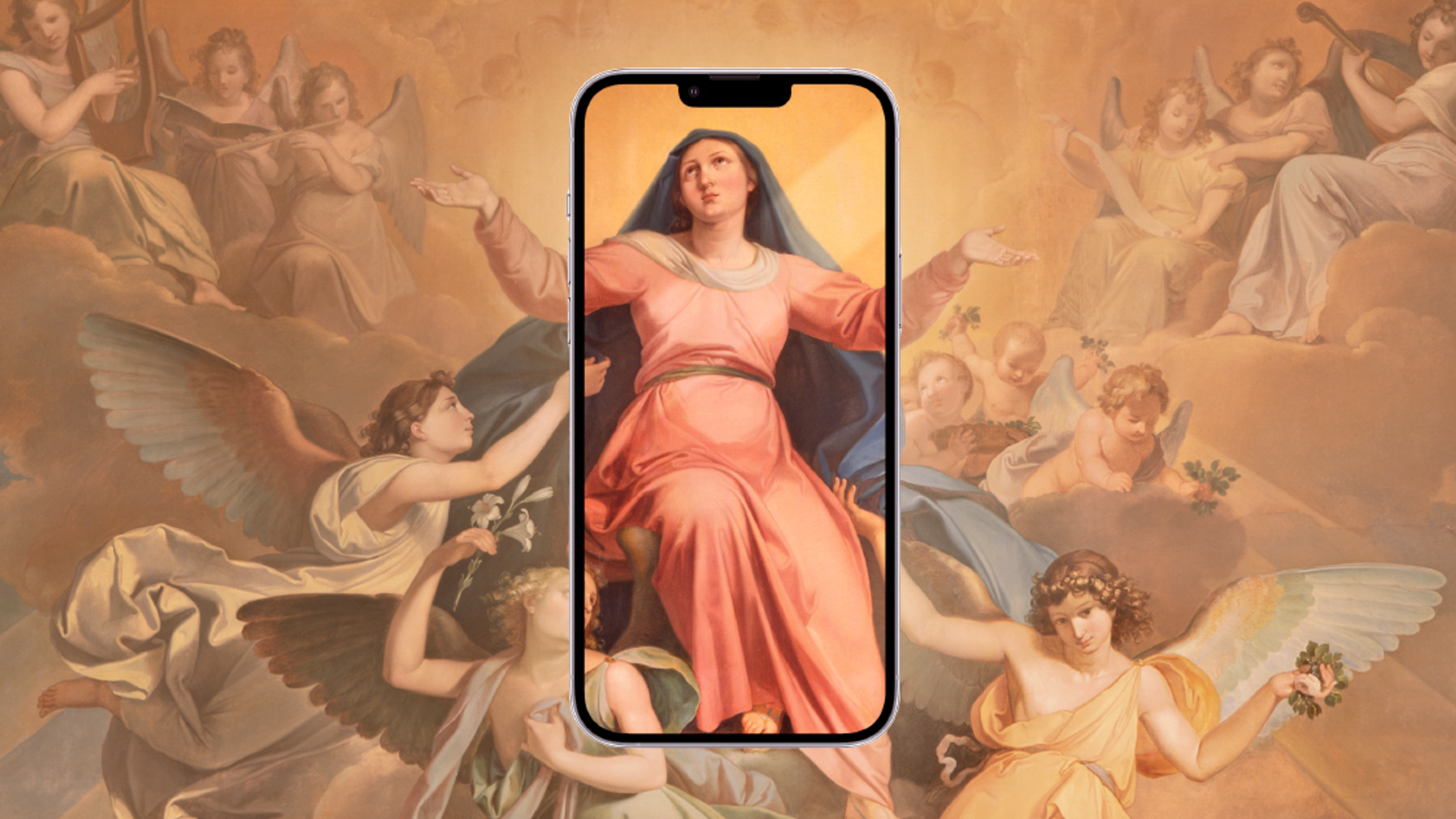
Before we jump into the Joyful Mysteries, let’s do a quick refresh of type (promise) and antitype (fulfillment).
In the Bible on Beads post, we discovered God’s promises to mankind through the Old Testament, and then saw how those promises are fulfilled by Jesus and His Church in the New Testament. Paragraph 128 of the Catechism of the Catholic Church tells us that “typology…discerns in God’s works of the Old Covenant a prefiguration of what He accomplished in the fullness of time in the person of His incarnate Son.” In other words, the Word-Made-Flesh, Jesus, is how God fulfills His promises to mankind.
What is God trying to accomplish through Salvation History?
He is trying to draw all of mankind back to Himself. God does this through a series of covenants that gradually restore and finally fulfill the original covenant He made with Adam and Eve at the creation of the world.
If we were to examine both the New Testament accounts from which we draw the Joyful Mysteries, and then spell out their Old Testament parallels… we’d end up writing volumes (volumes have been written on this topic). So instead, we’re going to focus on Luke’s Gospel and a very small portion of the Old Testament background.
The First Joyful Mystery: The Annunciation
In the New Testament, look at Luke 1:26-38. A seemingly ordinary young woman from a humble village is suddenly greeted with reverence by an angel of the Lord. From the beginning of time, Mary was chosen by God to be the pure and holy vessel through which the Son of God would enter the world.
In the sixth month the angel Gabriel was sent from God to a city of Galilee named Nazareth, to a virgin betrothed to a man whose name was Joseph, of the house of David; and the virgin’s name was Mary. And he came to her and said, “Rejoice, so highly favored! The Lord is with you.” (Luke 1:26-28)
Fully trusting in the Lord and joyfully embracing God’s plan, Mary responds: “Behold, I am the handmaid of the Lord; let it be to me according to your word” (Luke 1:38).
In the Old Testament, we have a few passages to examine for parallels:
o Judges 6:1-18:
In these passages, we hear of Gideon, a young Israelite who receives a message from an angel of the Lord. The Israelites had begun to worship the gods of the Amorites, and so the Lord gave the Israelites over to the Midianites for seven years. When the Israelites cried out to God for help, He reminded them that He had already brought them out of slavery, delivered them from the hand of the Egyptians, given them land — and yet they had still failed to listen to Him.
So, the angel appears to Gideon and says, “The Lord is with you, mighty warrior” (Judges 6:12). The angel tells Gideon that, despite Gideon’s position as least in his family — the weakest clan in Manasseh — the Lord will be with Gideon and thus he will strike down every last Midianite.
Once again, we see an unassuming young person from a humble background being elevated through the Lord’s strength and power to a position that is essential for the salvation of a particular group of people.
o Judith 13:1-20:
Judith, a widow from Bethuliah, seduces and murders the Persian general Holofernes, whose army has besieged her town. She hangs his severed head on the city walls, and the enemies of Bethuliah panic and flee. Judith has saved her people; she is a true heroine and receives praise from the chief magistrate of the town, who had initially told her to leave the decision-making to the men.
Then Uzziah said, “Judith, my dear, the Most High God has blessed you more than any other woman on earth. How worthy of praise is the Lord God who created heaven and earth! He guided you as you cut off the head of our deadliest enemy. Your trust in God will never be forgotten by those who tell of God's power. May God give you everlasting honor for what you have done. May He reward you with blessings, because you remained faithful to Him and did not hesitate to risk your own life to relieve the oppression of your people” (Judith 13:18-20).
Other than the extreme praise she receives from Uzziah, the notable part of this story is that, before she takes any action, Judith prays to God, telling Him that she obediently accepts His plan — though she does not understand it. She asks Him to give her His strength, and is thus able to devise a deceitful plan to permanently rid the town of Holofernes and his army.
Like Mary, Judith puts her full trust in the Lord, and for that, she receives honor and praise from her people.
o Daniel 9:20-27:
The angel Gabriel appears to Daniel, who is in the middle of praying to God, confessing his sins and the sins of his people, and petitioning the Lord to forgive the Israelites and rebuild Jerusalem so that God’s glory can once more be reflected in their land. Gabriel’s appearance is the Lord’s answer to Daniel’s prayer.
Gabriel has come to deliver insight and understanding to Daniel in the form of a prophesy:
Seventy ‘sevens’ are decreed for your people and your holy city to finish transgression, to put an end to sin, to atone for wickedness, to bring in everlasting righteousness, to seal up vision and prophecy and to anoint the Most Holy Place. “Know and understand this: From the time the word goes out to restore and rebuild Jerusalem until the Anointed One, the ruler, comes, there will be seven ‘sevens,’ and sixty-two ‘sevens.’ It will be rebuilt with streets and a trench, but in times of trouble. After the sixty-two ‘sevens,’ the Anointed One will be put to death and will have nothing” (Daniel 9:24-26).
Notice that Gabriel only appears twice more in the Bible: once to Zachariah, the father of John the Baptist in Luke 1:11, to explain that his wife Elizabeth would bear a son who would ready his people for the coming of their Savior; and then to Mary, to reveal that she herself would carry the Savior of the world in her womb. All three of Gabriel’s appearances point the way to Jesus’ coming. Gabriel is therefore a messenger of great hope for the salvation of mankind.
The Second Joyful Mystery: The Visitation
In the New Testament, look at Luke 1:39-56:
Though Mary’s cousin Elizabeth has been barren for the entirety of her life, Mary learns (in the Annunciation) that Elizabeth is miraculously expecting a child in her old age. Upon meeting, both women are filled with joy. Elizabeth recognizes her Lord and Savior in the womb of her cousin, and even the baby in Elizabeth’s womb leaps for joy in the presence of Jesus.
In those days Mary arose and went with haste into the hill country, to a city of Judah, and she entered the house of Zechariah and greeted Elizabeth. And when Elizabeth heard the greeting of Mary, the babe leaped in her womb; and Elizabeth was filled with the Holy Spirit and she exclaimed with a loud cry, “Blessed are you among women, and blessed is the fruit of your womb! And why is this granted me, that the mother of my Lord should come to me?” (Luke 1:39-43)
In the Old Testament, we have a couple of parallels:
o 1 Samuel 2:1-10:
Hannah is one of two wives of Elkanah, beloved by him but unable to conceive. Elkanah’s other wife, Peninnah, has consistently reminded Hannah of her childlessness and made her life miserable. So, one year at Shiloh, Hannah prays to God in anguish. She promises her firstborn son to God, as His servant for all the days of his life.
In time, God answers Hannah’s prayer and she conceives Samuel. Hannah keeps her word, presenting Samuel to the priest Eli. God proceeds to bless Hannah with three more sons and two daughters, and she is filled with love and joy.
The prayer of Hannah shows her belief in the Lord, and His plan for salvation: “My heart rejoiceth in the Lord, mine horn is exalted in the Lord: my mouth is enlarged over mine enemies; because I rejoice in thy salvation” (1 Samuel 2:1). Hannah’s life demonstrates God’s positive response to those who come to Him in prayer.
Hannah, like Mary, is a mother whose child is the result of an unwavering faith in God — and whose child also has a very special destiny. Samuel becomes a prophet of God, and is chosen to anoint and counsel the kings of Israel. He warns the people of Israel to turn away from false idols and worship the one true God. And of course, we know the “special destiny” of Mary’s child — the Redeemer, the Son of that one true God, Who has come for our salvation.
The parallels between the passages from Luke and those from Samuel infer that Jesus is the Lord’s new servant; He is, in fact, the ultimate servant. As Samuel was pivotal in the establishment of David’s kingdom, so Jesus is the one Who will establish God’s eternal kingdom.
o Psalm 35:9-10:
Then my soul will rejoice in the Lord
and delight in his salvation.
My whole being will exclaim,
“Who is like you, Lord?
You rescue the poor from those too strong for them,
the poor and needy from those who rob them.”
This Psalm itself is a prayer for rescue from unjust enemies, but these two verses closely mirror Mary’s words in Luke 1:46-47, “My soul glorifies the Lord, and my spirit rejoices in God my Savior.”
Humanity was unjustly persecuted by the Enemy, but Jesus has delivered us from that Enemy.
The Third Joyful Mystery: The Nativity
In the New Testament, we’ll focus on Luke 2:1-20:
In those days a decree went out from Caesar Augustus that all the world should be enrolled… And all went to be enrolled, each to his own city. And Joseph also went up from Galilee, from the city of Nazareth, to Judea, to the city of David, which is called Bethlehem, because he was of the house and lineage of David, to be enrolled with Mary his betrothed, who was with child. And while they were there, the time came for her to be delivered. And she gave birth to her first-born son and wrapped him in swaddling cloths, and laid him in a manger, because there was no place for them in the inn. (Luke 2:1, 3-7)
The Lord Jesus, our greatest King, is born into extreme poverty — and yet He is immediately recognized and exalted by kings and shepherds alike; their faith is joyful and enthusiastic. Angels from heaven appear and praise Him. They welcome Him with refrains of “Glory to God!”
From the Old Testament, we’ll focus on Micah 5:1-4.
These passages specifically refer to the “Lost Tribes” of Israel: “Therefore Israel will be abandoned until the time when she who is in labor bears a son, and the rest of his brothers return to join the Israelites” (Micah 5:3). However, this promise finds its ultimate fulfillment in the return of “lost humanity” into the covenant family of God:
He will stand and shepherd his flock
in the strength of the Lord,
in the majesty of the name of the Lord his God.
And they will live securely, for then his greatness
will reach to the ends of the earth.
(Micah 5:4)
We can clearly see the connection to the New Testament — that, even at birth, Jesus has a “flock” of people coming to Him — they sing His praises, they know His greatness, and they look to Him for hope and rejoice in His presence.
The Fourth Joyful Mystery: The Presentation
In the New Testament, the presentation of a first-born son in the Temple, dedicating him to the Lord, is a standard practice commanded by the Law of Moses. When Mary and Joseph bring Jesus to the Temple, they encounter an aged man named Simeon, who has waited all his life to meet his Lord Christ.
For now, we're going to focus on Luke 2:22-38, specifically on the Canticle of Simeon.
Simeon took [Jesus] in his arms and praised God, saying:
“Sovereign Lord, as you have promised,
you may now dismiss your servant in peace.
For my eyes have seen your salvation,
which you have prepared in the sight of all nations:
a light for revelation to the Gentiles,
and the glory of your people Israel.”
(Luke 2:28-32)
His prayer calls to mind the prophecy in Isaiah 42:1-9:
“Here is my servant, whom I uphold,
my chosen one in whom I delight;
I will put my Spirit on him,
and he will bring justice to the nations.
(Isaiah 42:1)
It continues, but you can see the similarities. The Lord gives breath, life, and hope; for those people who have faith in Him, justice will prevail. The blind will see, and captives will be set free. Let’s see how this reflects the words from the Old Testament.
In the Old Testament, Isaiah 42:1-9 includes some very similar wording; these passages speak of the “chosen servant, with whom I am well-pleased. I have put my Spirit upon him; he will bring forth justice to the nations” (Isaiah 42:1). We'll hear these words again at Jesus' Baptism in the Jordan.
I am the Lord, I have called you in righteousness,
I have taken you by the hand and kept you;
I have given you as a covenant to the people,
a light to the nations,
to open the eyes that are blind,
to bring out the prisoners from the dungeon,
from the prison those who sit in darkness.
(Isaiah 42:6-7)
Initially, Israel was intended to be a light to the nations. But now God promises someone who will be a “covenant for the people, a light for the nations.” This person, this living covenant, will “open the eyes of the blind… bring out prisoners from confinement, and from the dungeon, those who live in darkness.”
Not only does Christ heal the physically blind, but he also heals the spiritually blind, and he sets free those people held captive by sin since the fall of Adam and Eve.
The Fifth Joyful Mystery: The Finding in the Temple
Our New Testament passage is from Luke 2:41-52:
Supposing him to be in the company they went a day’s journey, and they sought him among their kinsfolk and acquaintances; and when they did not find him, they returned to Jerusalem, seeking him. (Luke 2:44)
Mary and Joseph have gone three whole days without finding their son, and they are anxious. They finally locate him in the Temple, where the Jewish rabbis are amazed by Jesus’ knowledge. When they confront Him about his actions, Jesus’ reply is that how could they not know he would be in his Father’s house? “I must be about my Father’s work” (Luke 2:49).
Jesus is the ultimate fulfillment of the Law and the Prophets from the Old Testament. The true goal, the “Father’s work,” is ultimately restoring humankind to a family relationship with Him.
If you’ve made it this far, congratulations!
It is my hope that a deeper understanding of God’s promises fulfilled will bring about an elevated level of joy and peace within you, especially during the practice of your daily Rosary.
It is also my hope that, with the background knowledge of each mystery, you can pinpoint opportunities within your own life to mirror the unwavering faith and heartfelt prayer we see in people like Daniel, Hannah, Gideon, and Judith — people who, though humble in position and status, recognize that the Lord’s strength within them can make possible any accomplishment that works toward the good.
If you’re committing to praying the Rosary on a daily basis, please let us know.
Follow us on Facebook and Instagram, and join the growing community of others committed to praying the Rosary daily. Share you’re Rosary story on our Facebook page, and let us know if we’ve missed anything. It is our sincere hope that our community will inspire you to continue this extremely fruitful practice.



